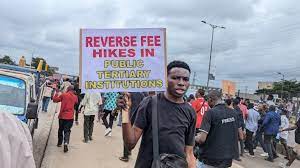
Growing Discontent Among Nigerians
In recent months, Nigeria has witnessed a surge in protests as citizens express their frustration with the country’s worsening economic conditions and perceived poor governance. From Lagos to Abuja, thousands of Nigerians have taken to the streets, holding placards and chanting slogans demanding change.
Economic Hardships Hit Hard
Nigeria, Africa’s largest economy, has been grappling with numerous challenges, including high inflation rates, rising unemployment, and a depreciating currency. The cost of living has skyrocketed, leaving many Nigerians struggling to afford basic necessities such as food, fuel, and housing. The economic hardships have hit the average Nigerian hard, exacerbating existing inequalities and pushing more people into poverty.
See Here:
A Cry for Accountability and Good Governance
Protesters are not just angry about the economic situation; they are also calling for better governance and accountability. Corruption, mismanagement, and lack of transparency have long plagued Nigeria’s political landscape. Many citizens feel that their leaders are disconnected from the realities faced by ordinary people, and they are demanding more responsible and responsive governance.
The Role of Social Media in Mobilizing Protests
Social media has played a crucial role in mobilizing protests and amplifying voices. Platforms like Twitter, Facebook, and Instagram have been used to organize rallies, share information, and bring global attention to the issues facing Nigerians. Hashtags like #EndSARS, initially used to protest police brutality, have evolved to encompass broader demands for systemic change.
Government’s Response to the Protests
The Nigerian government has responded to the protests with a mix of concessions and crackdowns. While some officials have acknowledged the grievances and promised reforms, others have taken a more hardline approach, deploying security forces to disperse crowds and arrest demonstrators. This response has further fueled anger and resentment among the populace.
Looking Ahead: The Future of the Movement
As the protests continue, many Nigerians are hopeful that sustained pressure will lead to meaningful change. Civil society groups, activists, and ordinary citizens are calling for comprehensive reforms, including measures to combat corruption, improve public services, and ensure a fairer distribution of resources. However, the road ahead is uncertain, and much will depend on the government’s willingness to listen and act on the demands of its people.
In a country with a youthful population and a history of activism, the current wave of protests reflects a growing determination among Nigerians to hold their leaders accountable and demand a better future. As one protester put it, “We are tired of suffering. We deserve better, and we won’t stop until we get it





